The Boston College Eagles hockey program stands as one of college hockey’s most storied traditions—a dynasty built on five national championships, legendary coaching, intense rivalries, and a commitment to excellence spanning nearly a century. From modest beginnings in the 1930s to dominating the 2000s with four championships in twelve seasons, BC hockey has produced NHL stars, Hobey Baker winners, and unforgettable moments that defined college hockey history.
This comprehensive guide explores the complete history of Boston College hockey—from founding through championship eras, legendary figures, fierce rivalries, facility evolution, and how modern programs celebrate hockey excellence through innovative digital recognition that honors tradition while inspiring future generations.
Boston College hockey represents more than athletic achievement—it embodies institutional pride, community identity, and a standard of excellence that attracts the nation’s top talent while developing character alongside competitive success. Understanding this rich history provides context for one of college hockey’s premier programs and offers lessons applicable to hockey programs at all levels.
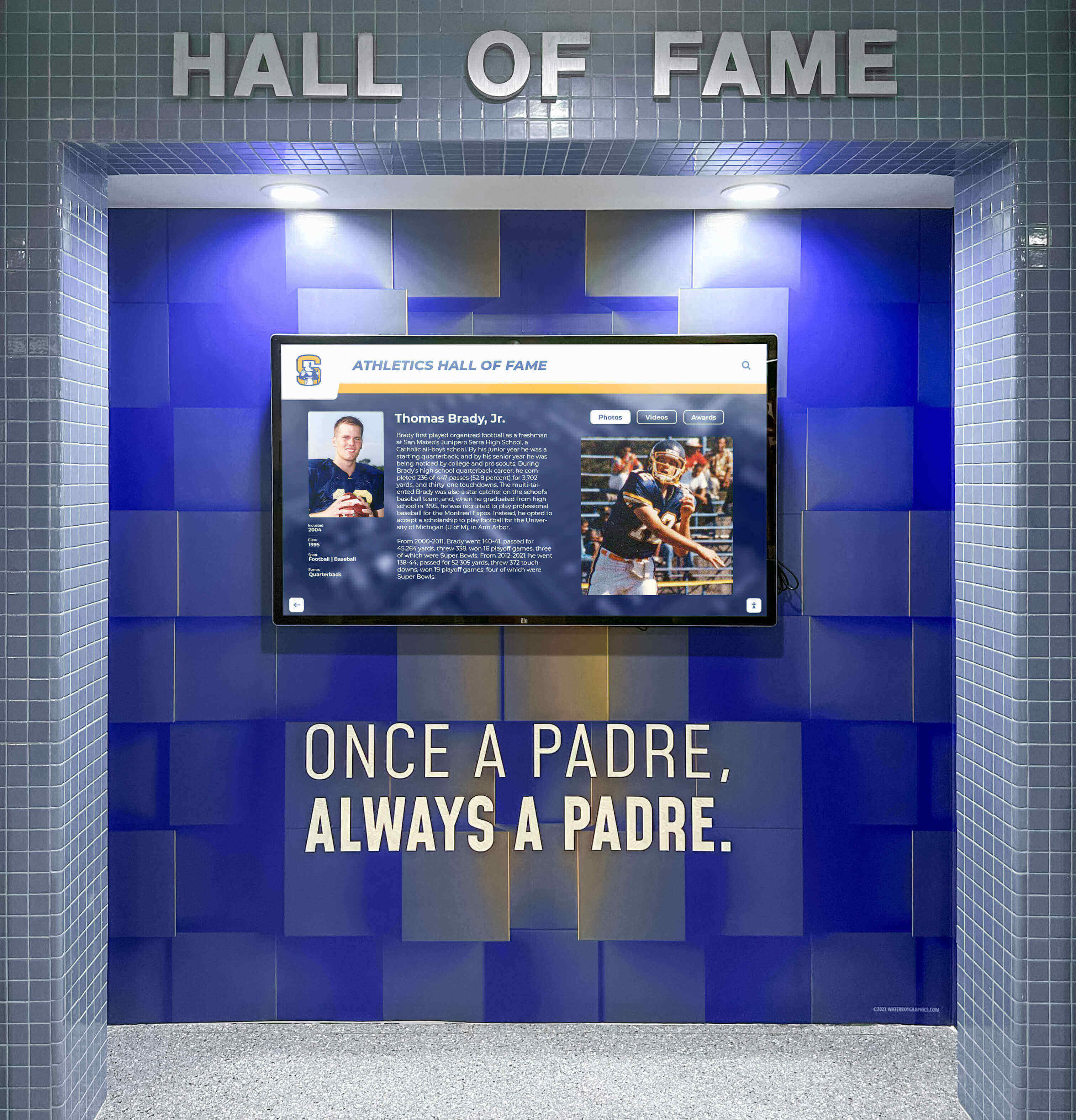
Modern recognition systems preserve hockey traditions while celebrating championship legacies
The Founding Era: Building a Program (1917-1949)
Boston College hockey emerged during college hockey’s formative years, establishing traditions and competitive standards that would define the program for generations.
The Early Years (1917-1932)
Hockey at Boston College existed informally beginning around 1917, with student-organized teams competing sporadically against local opponents. These early efforts lacked consistent coaching, funding, or institutional support, but demonstrated student passion for hockey that would eventually lead to formal program establishment.
During these formative years, BC hockey competed primarily against local colleges and amateur clubs, playing on outdoor rinks and borrowed facilities. The informal structure limited competitive success but established hockey’s presence on campus and built community support that would prove crucial for program development.
The Snooks Kelley Era Begins (1932-1933)
The modern era of Boston College hockey began when the institution established a formal team midway through the 1932-33 season. Under head coach Robert Fowler, BC became one of just 11 collegiate hockey programs nationally, setting out to write what would become an epic chapter in college hockey history.
The Eagles went 2-1 in their inaugural official season, but only one game came against a collegiate opponent: a 3-1 victory over Boston University. This first meeting with BU established what would become nearly 100 years of crosstown rivalry, one of college hockey’s fiercest and most significant competitive relationships.
Early Program Foundations:
- Establishment of formal coaching and training structure
- Development of regular competition schedule against collegiate opponents
- Building Boston University rivalry from first meeting
- Creating institutional identity around hockey excellence
- Establishing recruiting pathways bringing talent to Chestnut Hill
These foundational elements created infrastructure supporting program growth beyond informal student organization into legitimate athletic program competing at college hockey’s highest levels.
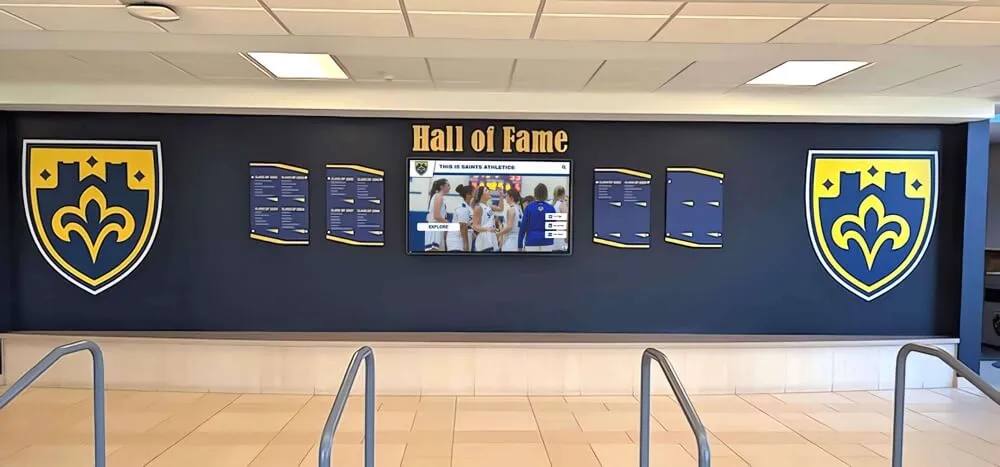
Recognition displays celebrate pioneering figures who established program foundations
John “Snooks” Kelley Takes Over (1933-1972)
John “Snooks” Kelley, a former BC player, agreed to coach the developing program beginning in 1933. This decision proved transformative for Boston College hockey. Over 36 years as head coach, Kelley became college hockey’s foundational figure at BC, establishing competitive standards and developing talent that elevated the program from regional competitor to national power.
Kelley’s Coaching Achievements:
- First college hockey coach to reach 500 career victories
- Led BC to its first national championship in 1949
- Established recruiting networks bringing top New England talent to BC
- Developed coaching philosophies emphasizing skill, discipline, and team play
- Created program culture prioritizing both athletic and academic excellence
- Built relationships with local youth programs creating talent pipeline
Kelley’s influence extended beyond statistics. He established BC hockey’s identity—tough, skilled, disciplined teams that competed relentlessly regardless of opponent reputation. His emphasis on recruiting quality individuals, not just talented players, created team chemistry distinguishing BC from competitors.
The 1949 National Championship: First Title
The pinnacle of the Kelley era arrived in 1949 when Boston College captured its first national championship. This breakthrough validated Kelley’s program-building approach while establishing BC among college hockey’s elite programs.
The 1949 championship team demonstrated characteristics that would define BC hockey for decades: exceptional goaltending, balanced scoring, disciplined defensive systems, and the ability to perform under pressure. The title elevated BC hockey’s national profile while proving that East Coast programs could compete with traditional Midwest powerhouses.
For programs documenting foundational achievements and championship moments, comprehensive digital recognition systems enable complete documentation of pioneering figures and breakthrough accomplishments that established program identity.
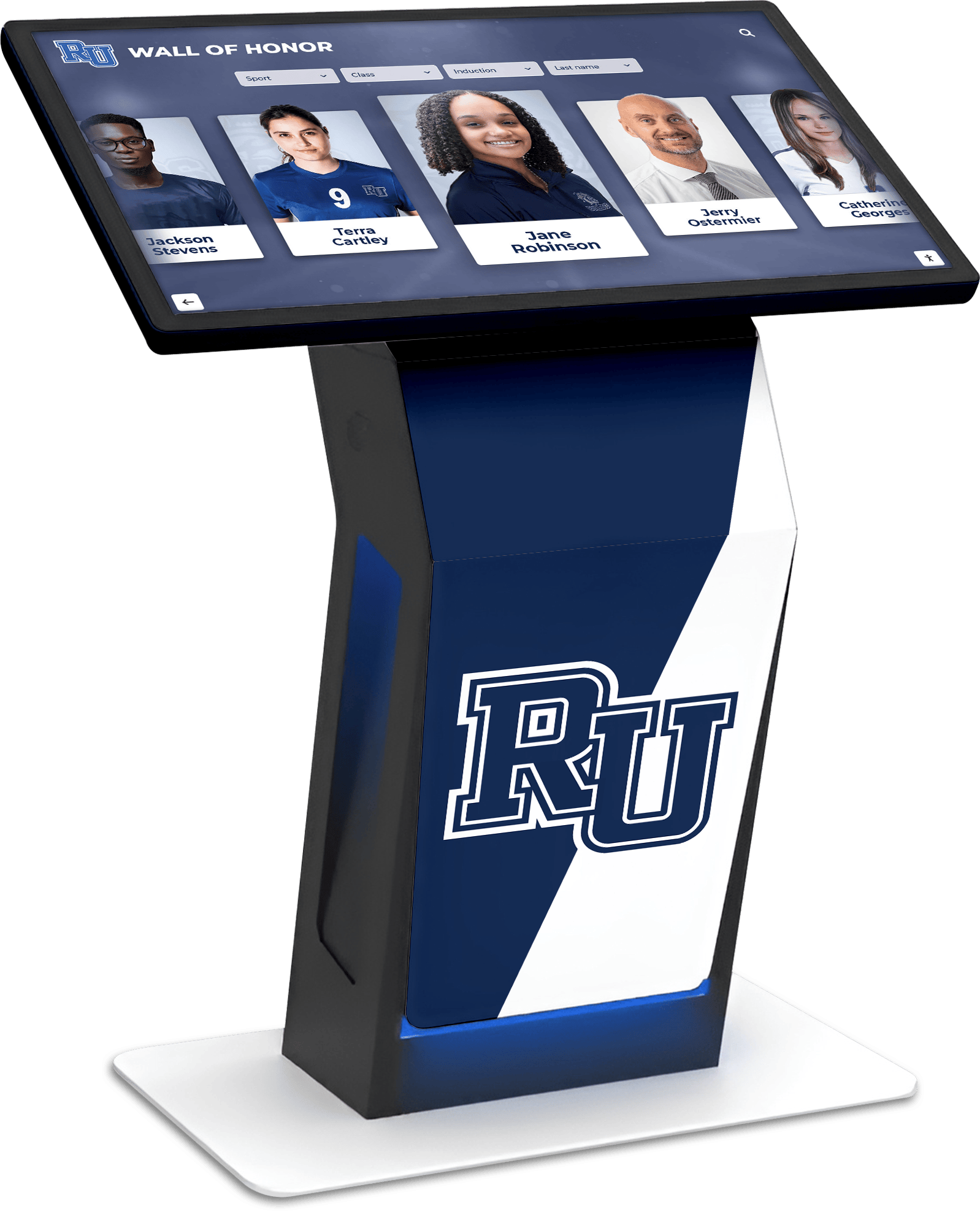
Digital recognition brings championship stories to life through multimedia storytelling
The Championship Drought Era (1950-2000)
Following the 1949 national championship, Boston College hockey maintained competitive excellence but endured a frustrating 52-year championship drought—making NCAA tournaments and Frozen Fours but repeatedly falling short of the ultimate goal.
Sustained Excellence Without Championships
Between 1949 and 2001, BC hockey compiled remarkable achievement metrics that would satisfy most programs, yet the absence of additional national championships created a sense of unfulfilled potential:
Championship Era Statistics:
- 19 NCAA tournament appearances demonstrating consistent competitiveness
- 14 Frozen Four appearances reaching college hockey’s final weekend
- 4 national championship game appearances coming tantalizingly close
- Multiple Hockey East regular season and tournament championships
- Continued development of NHL-caliber talent
- Maintenance of academic excellence alongside athletic achievement
This extended period demonstrated the difficulty of winning national championships in college hockey, where single-elimination tournaments create extraordinary parity and one poor performance or unlucky bounce can end championship hopes regardless of season-long excellence.
The Len Ceglarski Era (1972-1992)
When Snooks Kelley retired in 1972, Len Ceglarski inherited an established program with high expectations. Over 20 seasons, Ceglarski maintained BC’s competitive standard while adapting to evolving college hockey.
Ceglarski led BC to multiple NCAA tournament appearances and developed numerous professional players, but the elusive national championship remained beyond reach. His teams featured skilled, disciplined play that reflected BC’s traditional identity while incorporating modern tactical innovations.
Jerry York Arrives (1994)
The hiring of Jerry York from Bowling Green in 1994 proved transformative for Boston College hockey. York arrived with a national championship already on his resume (Bowling Green, 1984) and a reputation as college hockey’s premier program builder and talent developer.
York’s early BC years focused on recruiting elite talent, implementing sophisticated systems, and building program infrastructure supporting championship aspirations. While immediate championship success didn’t arrive, York established foundations that would produce extraordinary results in the coming decade.
For schools and organizations honoring coaching excellence, coach recognition programs celebrate the dedicated individuals whose leadership transforms programs and develops student-athletes beyond athletic skills.
The Golden Era: Four Championships in Twelve Seasons (2001-2012)
The 2000s represented Boston College hockey’s most dominant period—an unprecedented championship run establishing BC among college hockey’s all-time great dynasties.
Breaking Through: The 2001 National Championship
After 52 years of frustration, BC hockey finally captured its second national championship in 2001. The title broke the drought dramatically while validating Jerry York’s program-building approach.
The 2001 championship team featured future NHL standouts including:
- Brian Gionta: Hobey Baker finalist and future NHL All-Star
- Brooks Orpik: Defensive stalwart who enjoyed lengthy NHL career including Stanley Cup championship
- Chuck Kobasew: Skilled forward who reached professional hockey
- Krys Kolanos: Scoring forward selected in NHL draft first round
This roster combined elite individual talent with exceptional team chemistry. York’s system emphasized puck possession, defensive responsibility, and opportunistic offense—a formula proving devastatingly effective in tournament play.
The 2001 championship demonstrated that York’s patient approach was working. Rather than quick fixes or shortcuts, York had built sustainable excellence through recruiting, development, and culture creation. The title represented validation and the beginning of an extraordinary championship run.
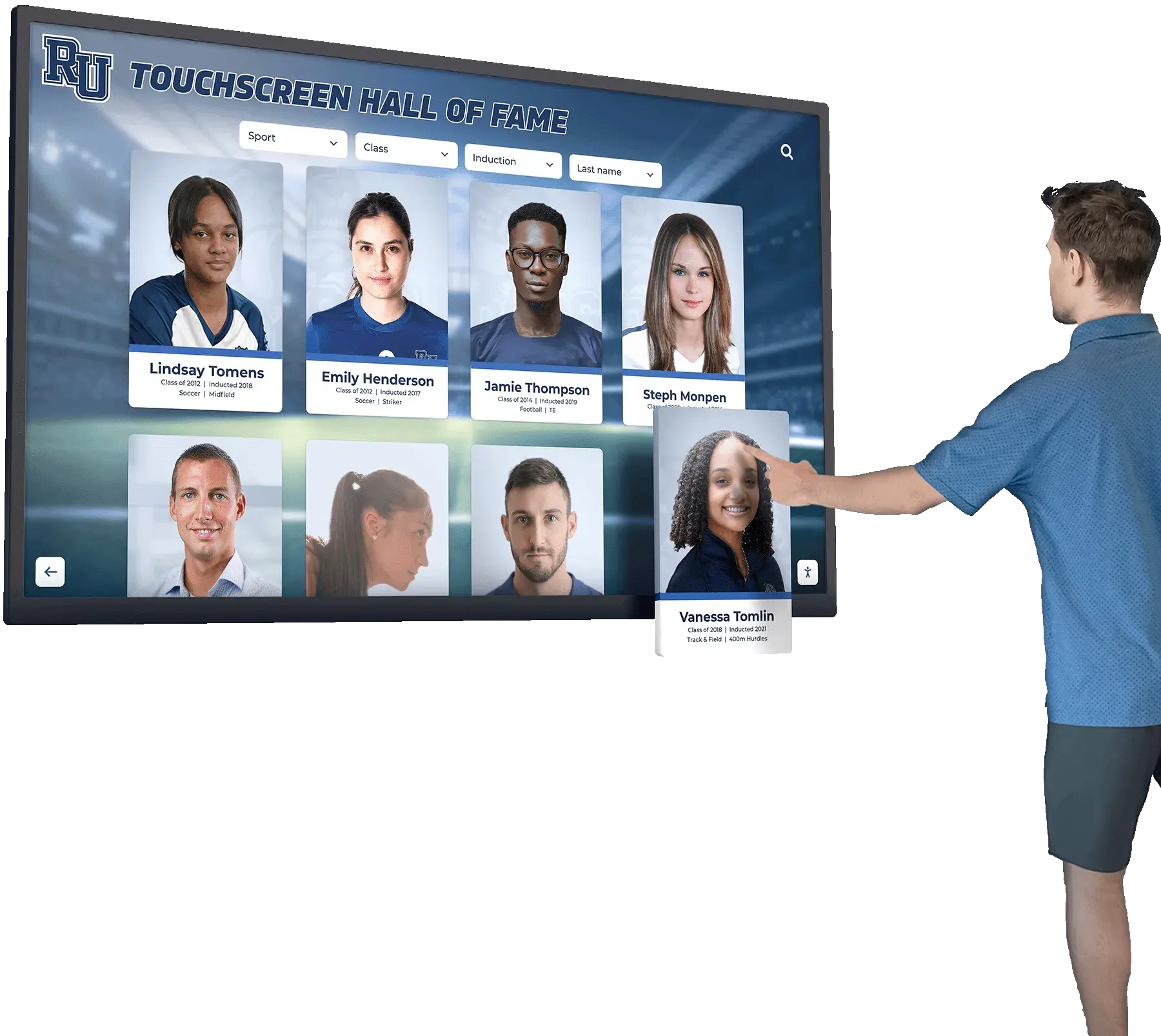
Digital platforms enable comprehensive recognition of championship rosters and individual achievements
The 2008 Championship: Establishing a Dynasty
Seven years after ending the drought, BC captured its third national championship in 2008. This title demonstrated that 2001 wasn’t a fortunate outlier but rather the beginning of sustained excellence.
The 2008 team featured exceptional goaltending, a balanced attack with multiple offensive threats, and York’s now-refined system functioning at its peak. The championship validated BC’s recruiting approach and development model while establishing the Eagles as college hockey’s premier program.
2008 Championship Team Characteristics:
- Elite goaltending providing foundation for success
- Multiple lines capable of scoring in crucial situations
- Defensive system limiting opponent opportunities
- Special teams excellence on both power play and penalty kill
- Veteran leadership guiding younger players through tournament pressure
- Tactical flexibility adjusting to different opponent styles
The 2010 Championship: Back-to-Back Titles
Just two years later, BC captured its fourth national championship in 2010, demonstrating sustained excellence rare in college hockey’s competitive landscape. The back-to-back championships (2008, 2010) established BC definitively as the era’s dominant program.
The 2010 roster featured future NHL players including:
- Cam Atkinson: Undersized but dynamic forward who enjoyed lengthy NHL career
- Brian Dumoulin: Steady defenseman who became NHL regular and Stanley Cup champion
- Chris Kreider: Power forward who joined NHL playoffs immediately after college season, scoring crucial goals
This championship demonstrated BC’s recruiting and development excellence—identifying talented prospects, developing their skills within the system, and maximizing performance during crucial tournament moments.
The 2012 Championship: Cementing Legacy
BC’s fifth national championship arrived in 2012, capping an extraordinary twelve-year run that included four national titles, multiple Frozen Four appearances, and sustained excellence unmatched in college hockey during this period.
The 2012 championship solidified Jerry York’s legacy as college hockey’s greatest coach while establishing Boston College among the sport’s all-time elite programs. Four championships in twelve seasons represented dynasty-level performance requiring exceptional recruiting, coaching, player development, and organizational excellence sustained across multiple roster cycles.
The Golden Era by the Numbers:
- 5 national championships total (1949, 2001, 2008, 2010, 2012)
- 4 titles in 12 seasons (2001-2012)
- 12 Frozen Four appearances during Jerry York era
- 18 NCAA tournament appearances under York
- 11 Hockey East regular season championships
- 9 Hockey East tournament titles
- 9 Beanpot championships
These statistics demonstrate unprecedented excellence requiring sustained commitment, resources, and organizational effectiveness across all program elements.
For universities and colleges celebrating multiple championships and sustained excellence, college athletic recognition systems provide platforms showcasing complete championship stories, roster recognition, and comprehensive program histories honoring decades of achievement.
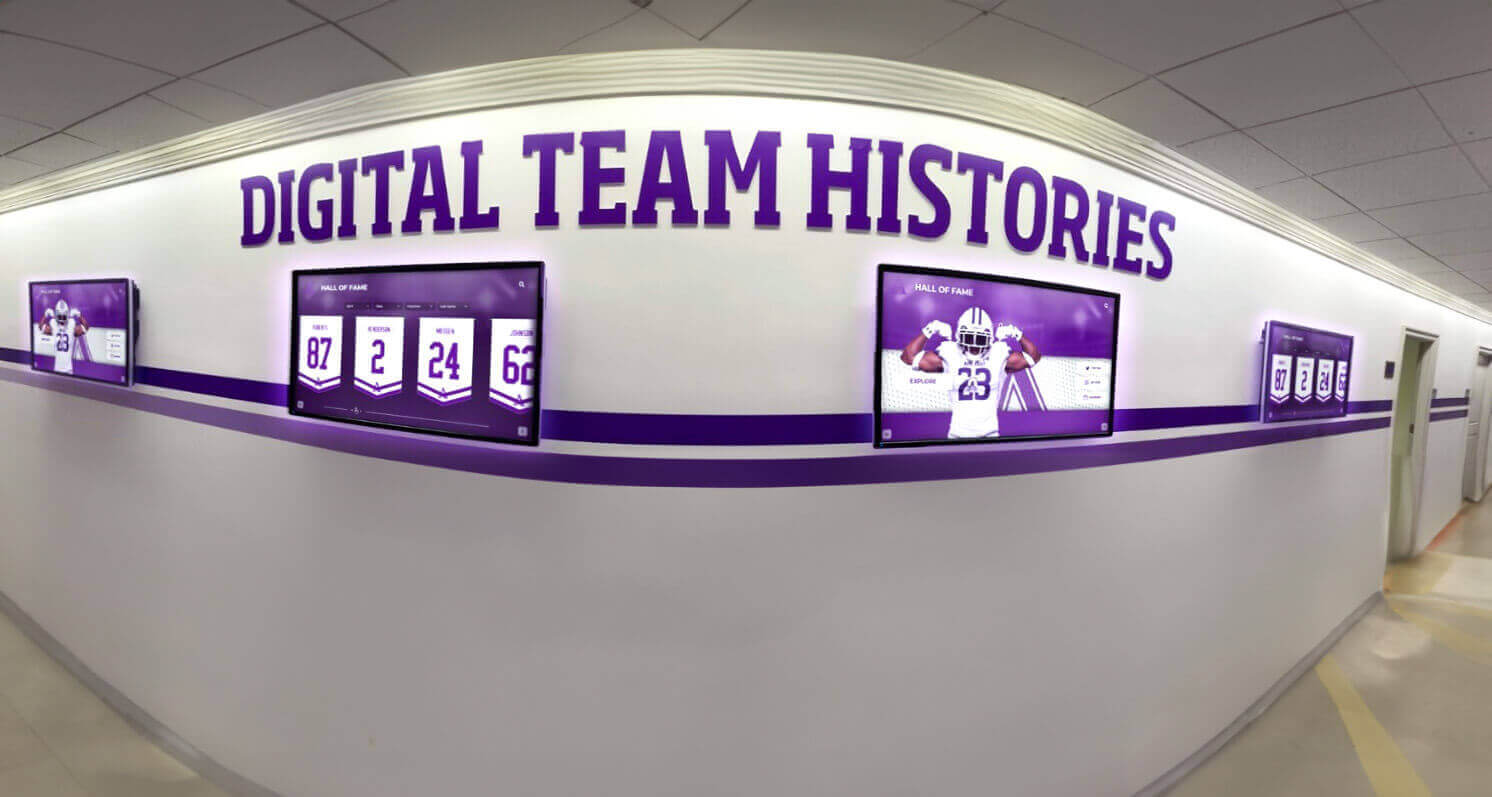
Comprehensive systems honor multiple championship teams across program history
Jerry York: The Winningest Coach in College Hockey History
Jerry York’s impact on Boston College hockey—and college hockey broadly—cannot be overstated. His 27-year BC tenure established him as the sport’s most successful coach while transforming the Eagles into a consistent championship contender.
Career Achievements and Milestones
York finished his extraordinary career with 1,123 victories, making him the winningest coach in NCAA hockey history. This remarkable achievement spanned 50 years behind college benches at Clarkson, Bowling Green, and Boston College.
Jerry York’s Accomplishments:
- 5 National Championships: Bowling Green (1984), Boston College (2001, 2008, 2010, 2012)
- 1,123 Career Wins: All-time NCAA record across all sports
- Hockey Hall of Fame Inductee (2019): Builders Category recognizing transformative impact
- U.S. Hockey Hall of Fame (2021): Honoring contributions to American hockey
- 41 NCAA Tournament Victories: Most all-time among college hockey coaches
- Multiple Coach of the Year Awards: Including Spencer Penrose Trophy
- 18 NHL First-Round Draft Picks Coached: Demonstrating player development excellence
- 58 Former Players in NHL: Alumni playing at least 50 NHL games
Beyond statistics, York’s influence manifested through coaching philosophy emphasizing character development alongside competitive success. He recruited quality individuals who fit BC’s academic and cultural standards, developed their hockey skills within sophisticated systems, and prepared them for professional and life success beyond college hockey.
Coaching Philosophy and Player Development
York’s approach combined tactical sophistication with relationship-building and character development:
York’s Coaching Principles:
- Elite Skill Development: Emphasis on skating, puck skills, and hockey IQ
- Defensive Responsibility: Systems requiring all five players committed to defense
- Opportunistic Offense: Patient approach generating quality chances
- Special Teams Excellence: Power play and penalty kill as competitive advantages
- Academic Success: Non-negotiable commitment to classroom excellence
- Character First: Recruiting individuals with integrity, work ethic, and team-first mentality
- Professional Preparation: Developing skills and habits translating to NHL success
This comprehensive approach explained BC’s sustained excellence. Rather than quick fixes or shortcuts, York built sustainable programs attracting elite talent, developing complete players, and creating culture supporting championship performance.
York’s Two Hobey Baker Winners
During York’s BC tenure, two Eagles captured the Hobey Baker Memorial Award as college hockey’s best player:
Mike Mottau (2000): Exceptional defenseman who still holds BC’s career assists record (130). Mottau exemplified York’s emphasis on complete two-way play, excelling both defensively and contributing offensively throughout his career.
Johnny Gaudreau (2014): Dynamic forward who recorded 80 points in his junior season, the highest NCAA Division I total in 11 years. Gaudreau went on to NHL stardom with over 700 games, 200+ goals, and 450+ assists, becoming one of college hockey’s most successful professional alumni.
These Hobey Baker winners demonstrated BC’s consistent ability to attract and develop elite talent—a hallmark of York’s coaching excellence.
Legacy and Impact
When York retired in 2022 after 28 seasons at Boston College, he left a program transformed from competitive contender to consistent championship threat. His influence extended beyond BC, elevating college hockey’s profile nationally and internationally while demonstrating that sustained excellence derives from comprehensive approach to recruiting, development, and culture creation.
For programs honoring legendary coaching careers, comprehensive recognition platforms enable detailed documentation of coaching achievements, championship rosters, and the lasting impact transformative leaders create across decades.
Notable BC Hockey Alumni in the NHL
Boston College hockey’s excellence manifests through the remarkable number of alumni competing at hockey’s highest professional level. The program has consistently produced NHL-caliber talent across positions and generations.
Hobey Baker Winners in the NHL
BC’s Hobey Baker recipients enjoyed varying degrees of professional success:
David Emma (1991 Hobey Baker Winner): BC’s all-time leading scorer with 239 points, Emma had a brief professional career but demonstrated the elite college production that defined BC hockey excellence in the early 1990s.
Mike Mottau (2000 Hobey Baker Winner): Defenseman who played 299 NHL games across 10 seasons with multiple organizations, demonstrating the steady professional career typical of York-developed defensemen.
Johnny Gaudreau (2014 Hobey Baker Winner): Arguably BC’s most successful recent professional alumni, Gaudreau has appeared in over 700 NHL contests with 200+ goals and 450+ assists, earning multiple All-Star selections and establishing himself among the NHL’s elite forwards.
Championship Era Alumni
The golden championship era (2001-2012) produced numerous NHL regulars:
Brian Gionta: Captain of the 2001 championship team, Gionta enjoyed a distinguished NHL career including serving as captain of the Montreal Canadiens and New Jersey Devils. His leadership and scoring ability translated effectively to professional hockey.
Brooks Orpik: Physical defenseman from the 2001 championship team who played nearly 1,000 NHL games, won two Stanley Cups with Pittsburgh (2009) and Washington (2018), and established himself as one of hockey’s premier shutdown defensemen.
Chris Kreider: Member of the 2010 championship team who remarkably joined the New York Rangers during their 2012 Stanley Cup playoff run, scoring 5 goals before ever playing a regular season NHL game. Kreider has continued as Rangers’ core player for over a decade.
Cam Atkinson: Undersized but dynamic forward from the 2010 championship team who exceeded expectations by playing over 600 NHL games with 30-goal seasons demonstrating that skill and determination overcome size limitations.
Brian Dumoulin: Steady defenseman from the 2010 championship team who became Pittsburgh Penguins regular and won two Stanley Cups (2016, 2017), exemplifying BC’s consistent production of reliable NHL defensemen.
Recent BC Alumni
Beyond championship teams, BC continues producing NHL talent:
Noah Hanifin: First-round draft pick who has established himself as NHL regular defenseman across multiple organizations.
Thatcher Demko: Elite NHL goaltender for Vancouver Canucks, demonstrating BC’s continued ability to develop quality netminders.
Matthew Boldy: Recent first-round pick who has quickly established himself as NHL contributor, continuing BC’s tradition of producing professional forwards.
The consistent pipeline of BC alumni to professional hockey validates the program’s recruiting excellence, player development quality, and preparation for hockey’s highest level.
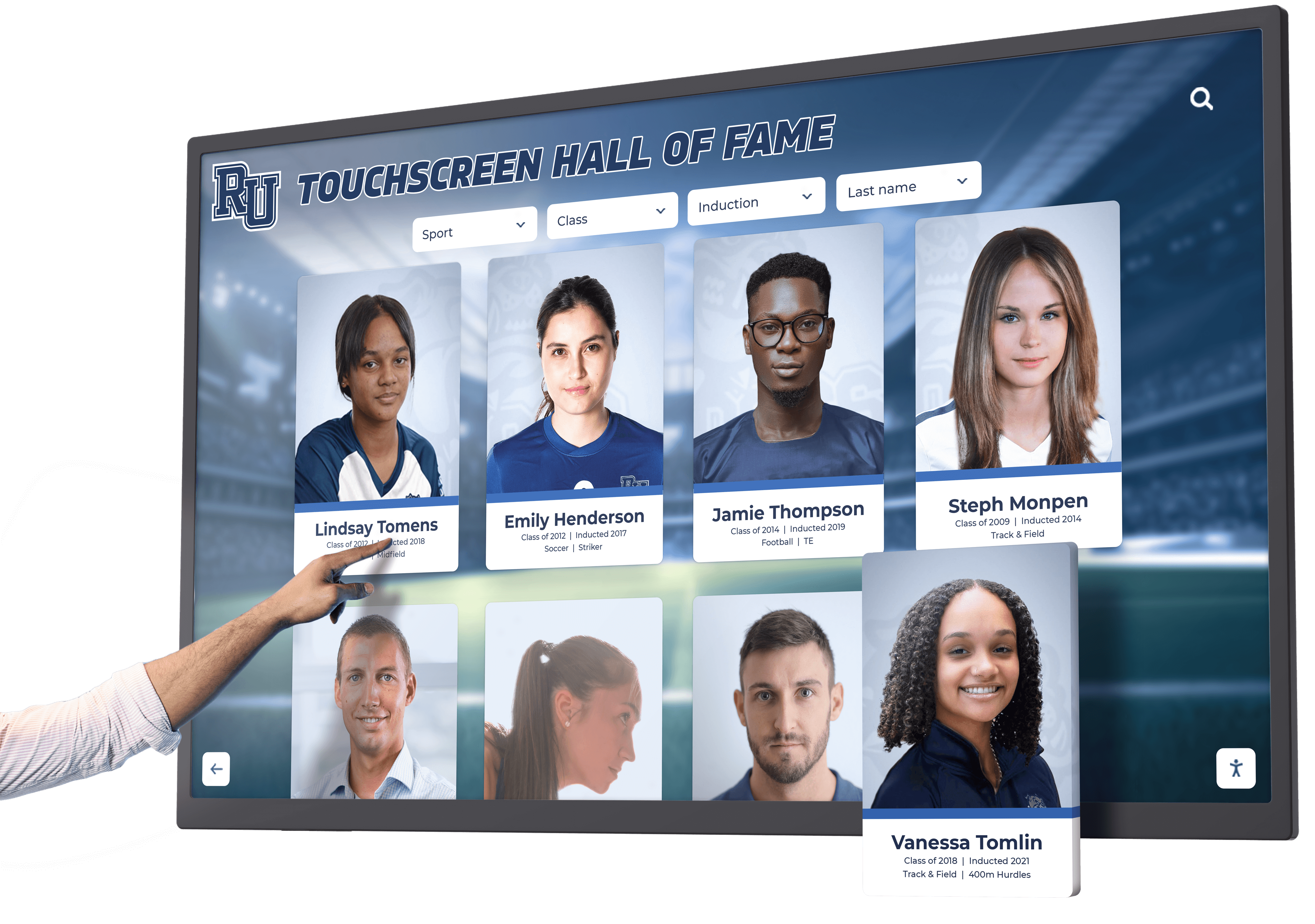
Modern recognition systems track alumni professional careers and ongoing accomplishments
The Green Line Rivalry: BC vs. BU
No discussion of Boston College hockey is complete without examining the fierce rivalry with Boston University—one of college sports’ most intense competitive relationships.
Rivalry Origins and History
BC and BU have competed since both programs’ founding, with the first meeting in BC’s inaugural 1933 season resulting in a BC victory. Located just four miles apart on Commonwealth Avenue (the Green Line), these crosstown rivals have played at least twice annually since 1949, accumulating over 295 meetings.
The all-time series remains remarkably close, separated by single digits with BU holding a narrow 140-134-21 advantage. This competitive balance—maintained across nearly a century—demonstrates sustained excellence from both programs and ensures every meeting carries championship implications.
Rivalry Significance:
- Both programs rank in top-4 all-time wins in college hockey history
- BC (1,714 all-time wins) at #3, BU (1,667) at #4
- Combined 10 national championships (BC: 5, BU: 5)
- Geographic proximity creating intense local fan interest
- Recruiting competition for top New England talent
- Games regularly determining conference championships and NCAA seeding
The rivalry extends beyond players to coaches, fans, and broader institutional identities. BC-BU games attract enormous local media coverage, sellout crowds, and passionate student sections creating electric atmospheres.
The Beanpot Tournament
The annual Beanpot Tournament, contested since 1952 among Boston’s four major college hockey programs (BC, BU, Harvard, Northeastern), provides the rivalry’s showcase venue.
Beanpot Dominance:
- BC has won 21 Beanpot championships
- BU has captured 32 Beanpot titles
- BC and BU have met in 23 championship games
- Until 2023, every Beanpot championship game featured BC or BU
- Both programs consider Beanpot victory essential to successful seasons
The Beanpot represents unique college hockey tradition—a mid-season tournament at TD Garden creating championship atmosphere and citywide attention typically reserved for postseason play. For BC and BU, Beanpot success validates recruiting, confirms competitive positioning, and provides bragging rights extending far beyond the two-week tournament.
Notably, all five BU national championships (1971, 1972, 1978, 1995, 2009) and BC’s four championships between 2001-2012 were accompanied by Beanpot victories the same season, suggesting the tournament provides momentum and confidence translating to postseason success.
Memorable Games and Moments
Nearly a century of competition has produced countless memorable moments:
- Championship game meetings determining conference titles and NCAA seeding
- Overtime thriller games decided by single goals
- Upset victories by underdogs defying expectations
- Individual performances by future NHL stars
- Physical battles reflecting intense competitive stakes
- Student section confrontations creating intimidating atmospheres
These moments accumulate into rivalry lore passed between generations of players, coaches, and fans—creating tradition enriching both programs’ identities.
For programs celebrating historic rivalries and memorable games, digital recognition platforms enable comprehensive documentation of competitive history, game results, and individual performances that defined eras and created lasting memories.
Conte Forum and Kelley Rink: Home Ice Advantage
Boston College hockey’s home facility provides competitive advantages while honoring program history through its naming and design.
Facility History
BC hockey has played home games at Kelley Rink at Conte Forum since 1988, replacing the previous home at McHugh Forum. The 8,606-seat multi-purpose arena was built on the site of McHugh Rink, providing modern facilities supporting the program’s championship aspirations.
Facility Specifications:
- Capacity: 7,884 for hockey (8,606 overall arena capacity)
- Rink Dimensions: 200 feet x 87 feet (Olympic dimensions)
- Opened: 1988
- Location: Chestnut Hill, Massachusetts campus
- Primary Uses: Hockey, basketball, graduation ceremonies, concerts
Honoring Program Legends
The facility’s naming honors two significant figures:
Conte Forum: Named for Silvio O. Conte, former United States congressman and Boston College alumnus (including BC Law School). Conte’s distinguished public service career and connection to the institution made him appropriate honoree for the multi-purpose venue.
Kelley Rink: The ice surface honors John “Snooks” Kelley, BC hockey’s foundational coach (1933-1972) who won the program’s first national championship in 1949 and established competitive standards defining BC hockey for generations. The entire arena is traditionally called “Kelley Rink” during hockey games, ensuring Kelley’s legacy remains central to the program he built.
Home Ice Advantage
Kelley Rink provides BC with significant competitive advantages:
- Intimidating Atmosphere: Vocal student sections and engaged fans creating hostile environment for opponents
- Facility Familiarity: Home team understanding rink peculiarities and optimal positioning
- Travel Convenience: Avoiding road trip fatigue and maintaining normal routines
- Recruiting Showcase: Impressive modern facility demonstrating program resources to prospective players
- Alumni Connection: Facility honoring program history while providing venue where alumni return for games and events
The combination of modern amenities and tradition creates facility that supports both competitive performance and program culture emphasizing excellence and history.
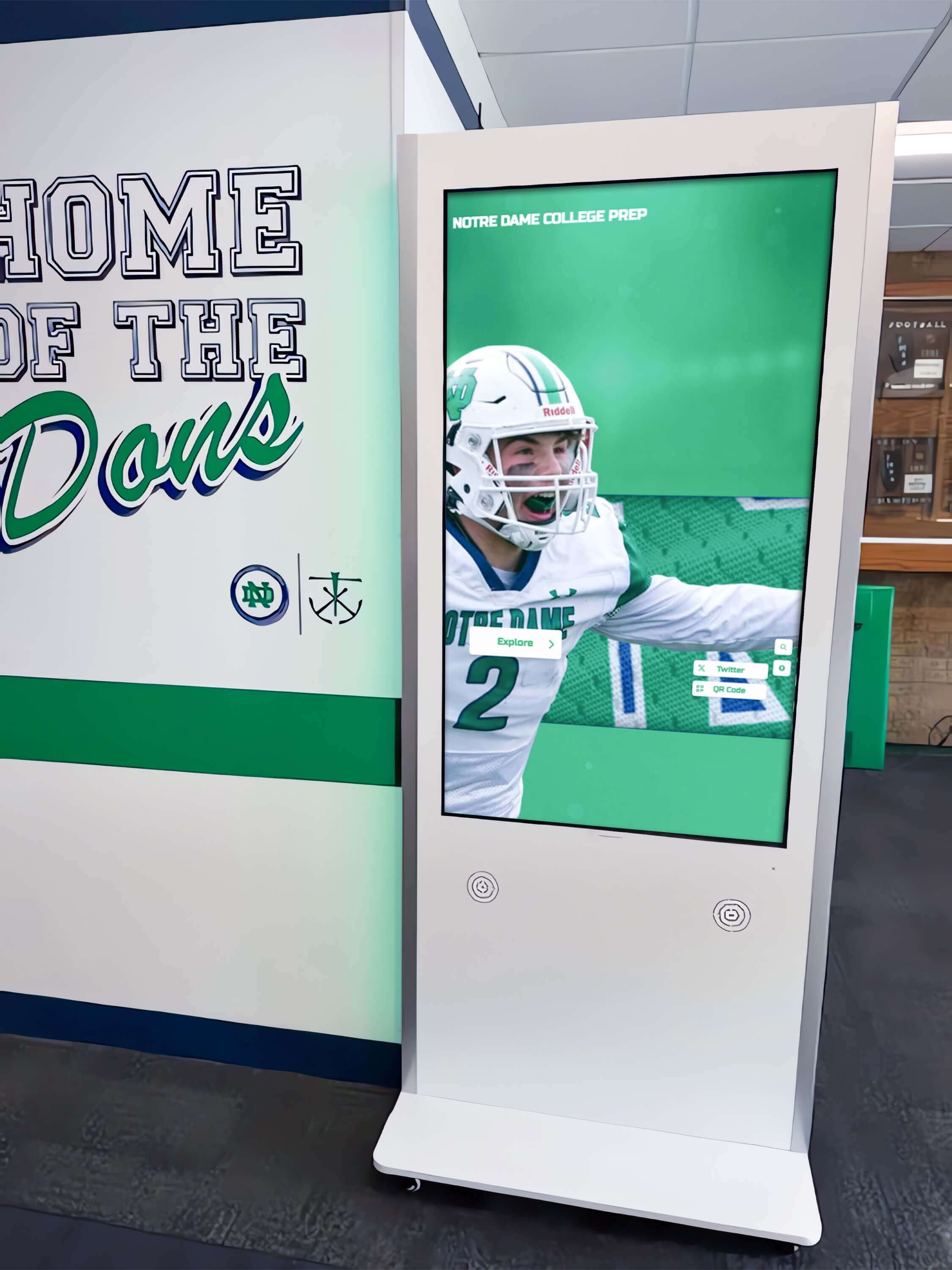
Strategic placement of recognition displays in athletic facilities maximizes visibility and engagement
Hockey East Conference: Competitive Excellence
Boston College competes in Hockey East, one of college hockey’s premier conferences featuring intense competition and multiple national championship contenders annually.
Conference Dominance
BC has established remarkable conference success since Hockey East’s 1984 founding:
Hockey East Achievements:
- 19 Regular Season Championships (most in conference history)
- 12 Tournament Championships (conference record)
- Consistent NCAA tournament qualification
- Multiple seasons ranked #1 nationally
- Regular production of All-Conference players and award winners
This conference dominance demonstrates BC’s sustained excellence across complete seasons, not just postseason tournaments. Regular season championships require consistency across months, handling adversity, and performing against conference opponents who specifically prepare for BC’s systems and talent.
Conference Rivalries
Beyond Boston University, BC maintains intense rivalries with other Hockey East programs:
Northeastern University: Boston-based program providing local rivalry dynamics and recruiting competition.
Providence College: Geographic proximity and competitive excellence creating meaningful rivalry.
UMass Lowell, UMass Amherst, Maine, New Hampshire: Traditional New England programs with histories against BC spanning decades.
These rivalries ensure that BC faces motivated opponents throughout conference play, preparing the team for NCAA tournament intensity while creating engaging regular season competition attracting fan interest.
Conference’s National Impact
Hockey East has established itself as college hockey’s strongest conference through sustained NCAA tournament success. Multiple conference members regularly compete for national championships, creating remarkable competitive depth requiring BC to perform at championship levels throughout conference play.
This competitive environment serves BC well—teams surviving Hockey East’s grind arrive at NCAA tournaments battle-tested and prepared for single-elimination pressure.
Recent Success and Current Era (2013-Present)
Following the 2012 championship, BC hockey has maintained competitive excellence while pursuing additional national titles.
2024: Return to Championship Game
The 2023-24 season represented a return to championship contention, with BC reaching the national championship game. The Eagles compiled a 34-5-1 record—a program record for wins—while capturing both Hockey East regular season and tournament championships.
2024 Season Highlights:
- 34-5-1 record (program record for wins)
- #1 national ranking throughout much of season
- Hockey East regular season championship (19th overall)
- Hockey East tournament championship (12th overall, first since 2012)
- Advanced to national championship game
- Freshman Will Smith scored 4 goals in Hockey East championship game
- Featured nation’s top penalty kill
While the Eagles fell short in the national championship game, the season demonstrated that BC remains among college hockey’s elite programs capable of competing for national titles annually.
Continued Recruiting Excellence
BC continues attracting elite talent, including:
- Top-ranked recruiting classes nationally
- Multiple NHL first-round draft picks
- International players complementing American talent
- Academic excellence alongside athletic ability
- Character and leadership qualities fitting BC culture
This recruiting success ensures that BC will remain competitive for championships indefinitely, maintaining the standards Jerry York established.
Looking Forward
Under current leadership, BC hockey pursues its sixth national championship while maintaining the excellence characterizing the program across nearly a century. The foundation—elite recruiting, comprehensive player development, sophisticated systems, competitive facilities, and culture emphasizing excellence—positions BC for continued success.
For hockey programs at all levels seeking to document ongoing achievements and current success, digital recognition solutions enable real-time updates celebrating recent accomplishments while providing historical context connecting current teams to program legacy.
Celebrating Hockey Excellence Through Modern Recognition
Boston College hockey’s extraordinary history deserves recognition matching its magnitude. Modern digital recognition solutions transform how programs honor achievements, preserve history, and inspire future generations.
Traditional Recognition Limitations
Hockey programs accumulate extensive recognition needs:
- Multiple championship teams requiring commemoration
- Individual records and statistical achievements
- Hobey Baker winners and award recipients
- NHL alumni tracking professional careers
- Coaching legends and program builders
- Historic rivalries and memorable games
- Facility evolution and tradition documentation
Traditional recognition approaches—trophy cases, banners, wall plaques—face significant constraints accommodating comprehensive needs. Physical space limitations force selective highlighting while extensive achievements receive inadequate recognition or disappear entirely.
Digital Recognition Advantages
Modern digital recognition platforms eliminate these limitations while enabling storytelling impossible with static displays:
Unlimited Capacity:
Digital systems showcase complete program histories without physical space constraints. Every championship team, record holder, award winner, and significant achievement receives appropriate recognition rather than selective highlighting based on available wall space.
Multimedia Integration:
Unlike plaques listing names and dates, digital platforms incorporate:
- Championship game video highlights and photos
- Complete player profiles with statistics, achievements, and career narratives
- Interactive record boards showing statistical progressions across program history
- Coach profiles documenting careers and philosophies
- Historical timelines contextualizing achievements across decades
- Audio recordings from memorable games and moments
- Alumni career tracking showing ongoing professional accomplishments
These multimedia elements create emotional connections and comprehensive storytelling that printed materials cannot match.
Real-Time Updates:
Cloud-based content management enables instant updates as achievements occur. When records fall, teams win championships, or alumni reach professional milestones, recognition displays update immediately rather than waiting months for physical fabrication.
Interactive Exploration:
Touchscreen interfaces enable visitors to explore content matching personal interests rather than viewing predetermined static presentations. Search capabilities allow instantly finding specific players, teams, years, or achievements, creating personalized experiences.
Web Accessibility:
Digital recognition extends beyond campus through web interfaces, allowing alumni worldwide to explore program history, share achievements on social media, and maintain connections to the program regardless of geographic distance.
Solutions like Rocket Alumni Solutions provide purpose-built platforms specifically designed for athletic recognition, combining intuitive content management with comprehensive features supporting hockey programs’ unique needs while honoring traditions through modern technology.
For universities and colleges celebrating hockey excellence across multiple decades, comprehensive recognition platforms preserve complete program stories while inspiring current players pursuing their own place in program history.
Lessons from Boston College Hockey Excellence
BC hockey’s sustained success offers valuable lessons applicable to programs at all competitive levels:
1. Culture Defines Success
BC’s championship culture—emphasizing character, academic excellence, team commitment, and competitive drive—attracts elite talent and creates environment supporting sustained success. Programs that establish clear cultural standards and recruit individuals fitting those standards position themselves for long-term excellence.
2. Patient Program Building
Jerry York’s approach demonstrated that sustainable excellence requires patient, comprehensive program building. Rather than quick fixes or shortcuts, York systematically recruited talent, developed players, refined systems, and created culture supporting championships. Programs willing to invest in foundations achieve lasting success exceeding short-term results.
3. Development Matters
BC consistently develops players beyond their arrival skill levels. Comprehensive player development—technical skills, tactical understanding, physical conditioning, mental toughness, leadership—maximizes talent and prepares players for success at next levels. Programs prioritizing development create competitive advantages over competitors relying solely on recruiting.
4. Rivalries Elevate Performance
The BC-BU rivalry pushes both programs to excellence. Intense competition forces coaches to recruit better, prepare more thoroughly, and execute more precisely. Programs that embrace rather than fear rivalry competition benefit through elevated standards and increased motivation.
5. Honoring History Inspires Future Success
BC’s recognition of legendary coaches, championship teams, and exceptional players creates inspirational environment connecting current players to program legacy. Thoughtful recognition demonstrates that today’s players contribute to continuing story, not isolated present moment.
6. Academic Excellence Complements Athletic Achievement
BC’s commitment to academic standards attracts quality individuals and prepares players for life success beyond hockey. Programs that refuse to compromise academic standards benefit through enhanced reputation and development of complete student-athletes.
These lessons apply regardless of competitive level—youth programs through professional organizations benefit from clear culture, patient building, comprehensive development, meaningful competition, historical recognition, and balanced priorities.
Conclusion: A Legacy of Excellence Continuing
Nearly a century after establishing its formal program, Boston College hockey stands among college hockey’s most successful and respected programs. Five national championships, legendary coaching, intense rivalries, consistent NHL player production, and unwavering commitment to excellence have created tradition inspiring generations of players, coaches, and fans.
From Snooks Kelley’s pioneering efforts through Jerry York’s unprecedented championship run to current teams pursuing additional titles, BC hockey represents sustained excellence built on clear principles: recruit quality individuals, develop complete players, establish sophisticated systems, embrace intense competition, honor tradition, and never compromise standards.
Celebrate Your Hockey Program's Excellence
Discover how Rocket Alumni Solutions can help your hockey program create compelling digital recognition displays celebrating championships, honoring alumni, and inspiring future generations through comprehensive, interactive technology designed specifically for athletic recognition.
Schedule Your Free ConsultationThe most effective recognition programs establish comprehensive documentation of program history, celebrate championship teams with detailed rosters and narratives, honor coaching legends and program builders, track alumni professional achievements, preserve rivalry history and memorable games, integrate multimedia content bringing stories to life, provide interactive exploration matching visitor interests, and maintain real-time updates keeping content current and relevant.
Boston College hockey’s remarkable story—from modest beginnings to national dynasty—demonstrates what sustained commitment to excellence achieves. For hockey programs at all levels, BC’s legacy offers inspiration and practical lessons applicable to their own journeys. Whether pursuing national championships or building youth program foundations, the principles defining BC’s success—culture, development, competition, recognition, and excellence—create pathways to achievement matching each program’s potential.
Ready to properly celebrate your hockey program’s achievements and inspire your next generation of players? Contact Rocket Alumni Solutions to explore how interactive digital displays can transform your hockey recognition program, or discover more about implementing comprehensive athletic recognition that honors your program’s complete story while connecting past excellence with future aspirations.































